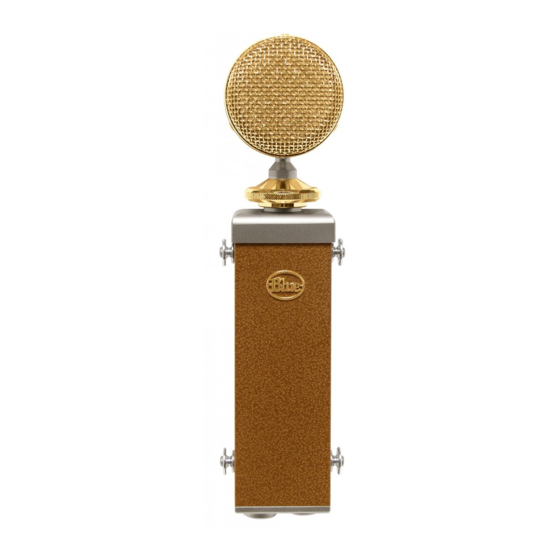
Advertisement
Quick Links
Advertisement

Subscribe to Our Youtube Channel
Summary of Contents for Blue Cactus
- Page 1 Cactus...
- Page 2 But this is also a Cactus you’ll definitely want to get close to! With its detailed highs, smooth...
- Page 3 The Cactus System and Electronics For mounting the microphone on a stand, a recessed, threaded socket is built into the bottom of the Cactus, next to the multi-pin The basic Cactus microphone system includes the Blue S2 Shock, output jack. The S2 cradle and adjustable yoke mount assembly...
- Page 4 Cactus | Omni Capsule and Pattern Characteristics At the heart of the Cactus is a multi-pattern variation of the B7 Bottle microphone capsule. This large diaphragm, single back- plate capsule is our contemporary version of the unmistakably warm sound ascribed to the great 1950’s tube microphones. A...
- Page 5 Vocals For a balanced sound with plenty of sparkling high end, position the Cactus facing the guitar neck, right where the neck joins the Here’s a little-known secret—vocalists love singing into unique and body (usually around the 12th-14th frets). For starters, use the impressive mics.
- Page 6 A less common, though very useful technique, is to position a and figure of eight pickup patterns will help offset a thin or overly stereo pair or single Cactus microphone just outside of the piano, bright timbre. either in the curve of a grand, above an upright, or a few feet...
- Page 7 On tambourine, shaker, bells, clave, and orchestral percussion the Cactus offers astounding clarity and realism, and can be The ECC 88 tube used in the Cactus is a single subminiature positioned quite close to a percussive source without distortion or pentode in a triode mode.
- Page 8 Both the Cactus, to tickle the taste buds as well as warm the coldest critic. heater and the plate voltages are ultra stable and non-dependent on AC main changes or fluctuations.
-
Page 9: Warranty
(BLUE) reserves the right to alter specifications without prior notice. ©2012. All rights reserved. Blue Microphones , Cactus , Powerstream , The Pop , Quad Cable , S2 Shock , and Blue Logo Oval are registered trademarks of Blue Microphones.















Need help?
Do you have a question about the Cactus and is the answer not in the manual?
Questions and answers